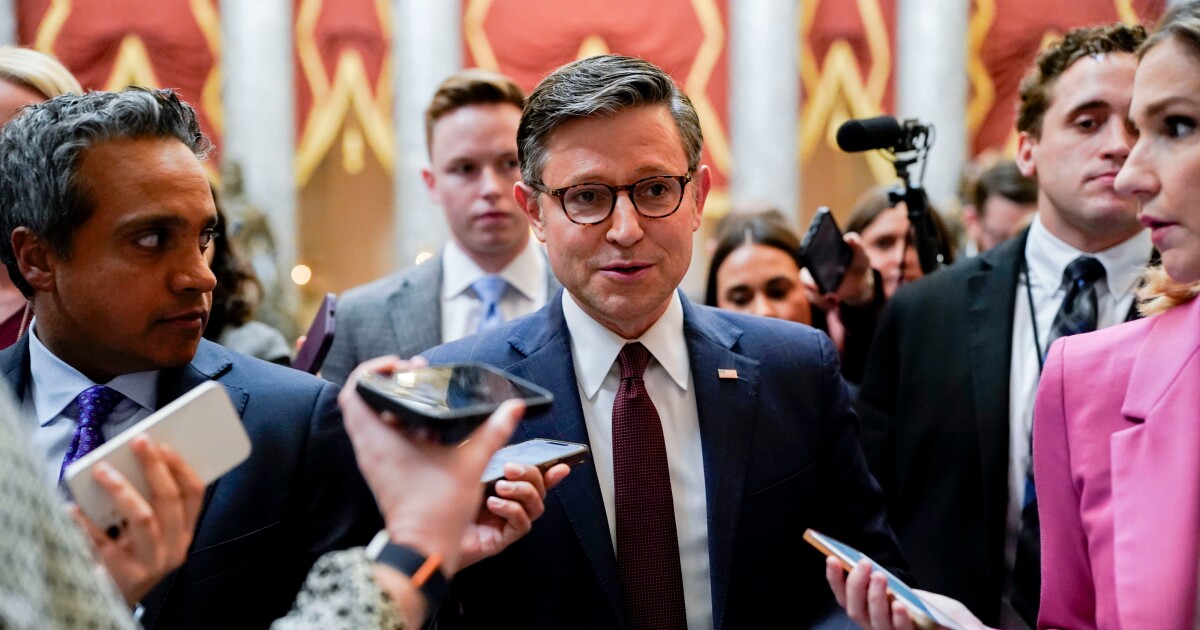Chances for early action on Donald Trump’s tax cut plans improved as House Republicans passed a budget blueprint Tuesday calling for deep cuts in safety-net programs such as Medicaid.
House Speaker Mike Johnson, aided by a flurry of last-minute phone calls Trump had with wavering Republicans, overcame resistance from fiscal conservatives worried about the impact on budget deficits and swing-district lawmakers concerned about reducing food assistance and health coverage for the poor and disabled.
The vote doesn’t guarantee an extension of the expiring 2017 Trump tax cuts. The Senate plans to make changes to the House blueprint before passing it and that could raise new objections among House Republicans.
The measure was in doubt for much of the day. Republicans, facing a quartet of holdouts, delayed, then initially canceled a planned vote on the measure, before reversing course minutes later to call lawmakers back for a vote. Three of the four Republicans who had opposed the budget plan earlier in the day ultimately voted yes.
The House budget would pave the way for $4.5 trillion in tax cuts — about enough to pay for extending the expiring cuts but not enough to also cover Trump’s campaign promises for additional tax relief. The measure would add to the budget deficit despite calling for $2 trillion in overall spending cuts over ten years.
The blueprint would raise the U.S. debt limit by $4 trillion, avoiding a potential payment default this summer.
Senate Republicans have said they will seek larger tax cuts and some Senate Republicans may object to the impact of the cuts on safety-net programs.
The House passed the budget plan 217 to 215. Only one Republican, Kentucky Representative Thomas Massie, voted against. All Democrats present opposed it.
The House budget calls for $2 trillion in cuts focused on safety-net programs like Medicaid, food stamps and education funding and calls for $300 billion in increased defense and border spending.
Nearly half of the spending cuts — $880 billion — would come from programs under the Energy and Commerce Committee, which oversees Medicaid, Obamacare and other health programs.
The budget sets targets for spending reductions but does not specify the cuts. Republican leaders have supported Medicaid work requirements and cracking down on improper payments, but those moves would not generate the required savings, making swing-district Republicans nervous about cuts to benefits and payments to providers.
“It doesn’t even mention Medicaid in the bill,” Johnson said earlier Tuesday as he tried to get moderates in his caucus behind the budget.
The budget blueprint is the first step in a process that allows Republicans to bypass Senate Democrats on legislation related to taxes and spending. Without a budget, Republicans would have to win over at least some Democratic senators to pass those bills.
Resistance from fiscal hawks in the party gelled after tech mogul Elon Musk, who is leading Trump’s Department of Government Efficiency, raised doubts about the budget blueprint in a post on X Monday night. Musk said the plan “sounds bad.”
Massie told reporters he had gone from leaning “no” to a firm “no” after leaders in a closed door meeting admitted that the plan would add to deficits in the first three years even with rosy economic assumptions.
Using conventional scoring methods, the budget would allow nearly $3 trillion in deficits over 10 years according to the independent watchdog the Committee for a Responsible Federal Budget.
All Democrats opposed the budget, arguing it amounts to a tax cut for the wealthy paid for by slashing programs for the poor.
Top Budget Democrat Brendan Boyle of Pennsylvania told reporters there’s no way to achieve the $880 billion cut in health-related spending without slashing Medicaid.
“The math is quite clear, there will be hundreds of billions of cuts to Medicaid — the largest in American history,” Boyle said.
Congress has until Dec. 31 to extend expiring individual and business tax cuts enacted in 2017.


 Economics1 week ago
Economics1 week ago
 Economics1 week ago
Economics1 week ago
 Economics1 week ago
Economics1 week ago
 Finance1 week ago
Finance1 week ago
 Blog Post1 week ago
Blog Post1 week ago
 Economics1 week ago
Economics1 week ago
 Personal Finance1 week ago
Personal Finance1 week ago
 Economics1 week ago
Economics1 week ago












